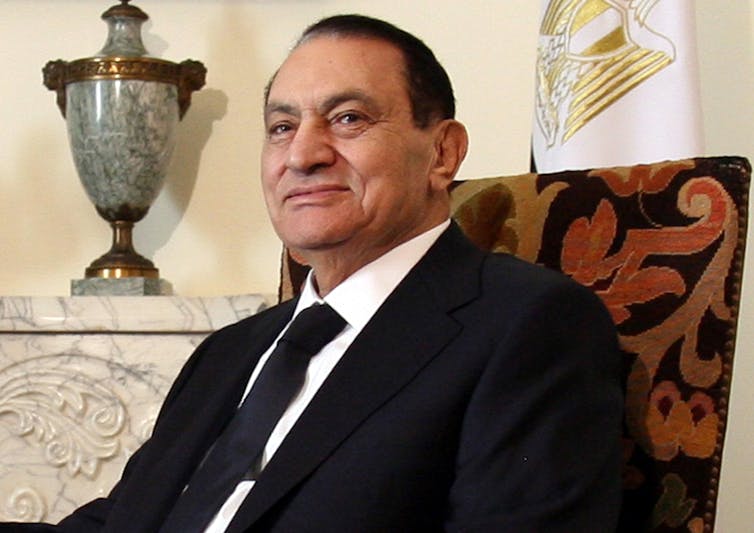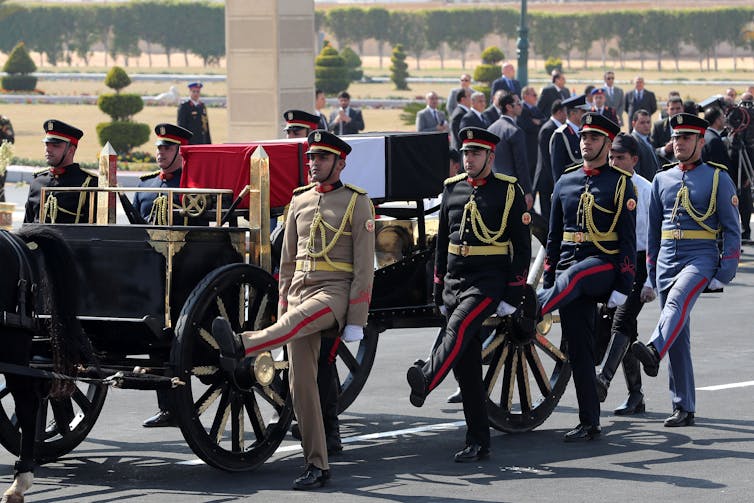
Mohamed Taha, SOAS, University of London
The 21-gun salute fired in eastern Cairo during the burial of the late president Hosni Mubarak was an elegant end to the life of a man preoccupied with building his image and personality cult.
In my book, The Arab Split, I emphasised how Mubarak was keen to build his reputation as a gentleman president, beloved by his people and respected by leaders the world over.
His desire to be smart, well-presented and always liked was an impediment,
to become head of the military aviation academy when he was still in his 30s. A few years later he became the commander of the air force.The role Mubarak played in the 1973 war with Israel led president Anwar el Sadat to choose him as his vice-president. Mubarak was inches away from Sadat when the president was shot dead by army officers during a parade in 1981. At the time many analysts thought he would lead the country for an interim period before a stronger leader could take over.
Instead, Mubarak became the longest-serving president of Egypt, staying almost 30 years in power. He survived by building on his talents for self-promotion while controlling or stifling political opposition. Even his strongest critics have noted that it took some skill to die a “normal, natural death” while all the other presidents; Mohamed Naguib, Gamal Abdel Nasser, Sadat, and Mohamed Morsi died in controversial circumstances.
My research on Mubarak’s personality in 2015 found that his long stay in power was founded upon building a personality cult. Professor of politics at the University of East Anglia John Street has argued that politicians and celebrities share a common identity. To succeed in the new globalised celebrity culture, politicians – much like celebrities – have to rely on self-promotion, advertising, targeting and branding.
According to Street, modern politics has become more a matter of marketing than of science – challenging the concepts of traditional marketing and classical political leadership. Mubarak managed to do that very well.
Image-making
Mubarak hired a top journalist, Makram Mohamed Ahmed, to write his speeches. He was very keen to have extensive coverage in the media for all his activities. He also sponsored annual extravagant musicals to commemorate the 6 October 1973 war, pouring praise on the many singers who performed for him and who sang songs in his name.
Propaganda was one of his main tools in building his image, and the widespread brainwashing of the masses reverberates back to French psychologist Gustave le Bon’s notion of the psychology of the masses.
When he came into office Mubarak promised to defend democracy in Egypt. Nevertheless, the political system he adopted in practice was authoritarian and very restrictive. Universal rights such as freedom of speech and freedom of assembly were trampled upon.
An authoritarian system is the basis of a strong personality cult.
His international image was particularly important to Mubarak.
He became a leading voice in the Israeli and Palestinian conflict, promoting aggressively the idea of a two-state solution. In 1989, Mubarak’s image was given a major boost when he raised the Egyptian flag on Taba, the resort that Israel kept under its authority even after Camp David. When Israel withdrew from Sinai it insisted that Taba, which borders the Israeli port of Eilat, was not part of Egypt and keeping it under the Israeli authority did not contradict the Camp David Egypt-Israeli peace treaty. The arbitration ruling on September 1988 proved that Israel was wrong.
Another moment of international limelight for Mubarak was Saddam Hussein’s invasion of Kuwait. Egyptians fought alongside the Americans to facilitate the Kuwait “liberation” and subsequent invasion of Iraq. On the back of this, Mubarak managed to return the Arab League headquarters to Cairo after 10 years of boycott following the Camp David peace agreement with Israel in 1978.
Back at home, Mubarak did less well. His relationship with the opposition grew steadily worse, reaching its all-time low in 2010 when he decided to exclude all opposition from the parliament. The emergency laws were in effect for the almost three decades of his rule. Last but not least, Mubarak was grooming his son Gamal to succeed him as a president. These efforts were silently opposed by the army but they had the chance to have their say during the January 2011 uprising, when they refused to support Mubarak over the demonstrators.

When it came to the Muslim Brotherhood, Mubarak
the organisation a level of freedom for activism. He allowed it to grow and control student unions and most of the professional organisations – such as those for doctors, engineers and teachers – and to build its wealth. But his regime made sure it was always under control.The military
The fact that Mubarak’s military funeral with full honours was attended by the Egyptian president and former Field Marshal Abdel Fattah el Sisi will keep future Egyptian generations in utter confusion for years to come. Was this the president who drove millions of Egyptians onto the streets for 18 days in January and February 2011, begging him to stand down, face justice and even face execution?
What were the feelings of thousands of Egyptian families who lost a loved one, or have a family member living with an injury or who were tortured during that “revolution”? Many have not yet heard an answer about who killed or injured their loved ones.
The highly formal full military funeral held one solid truth; those military men in Egypt, no matter what they do, are held in awe. The military is still in charge as it has been for the last 70 years. The image of the funeral was the image of the military and both the dead body of Mubarak in his coffin and the live body of Abdel Fattah el Sisi who was following the coffin grew from the same root: the “military institution” which has been ruling Egypt for decades.
Read more: Where next for Egypt's Muslim Brotherhood after death of Mohamed Morsi
Mohamed Taha, PhD Candidate, SOAS, University of London
This article is republished from The Conversation under a Creative Commons license. Read the original article.

